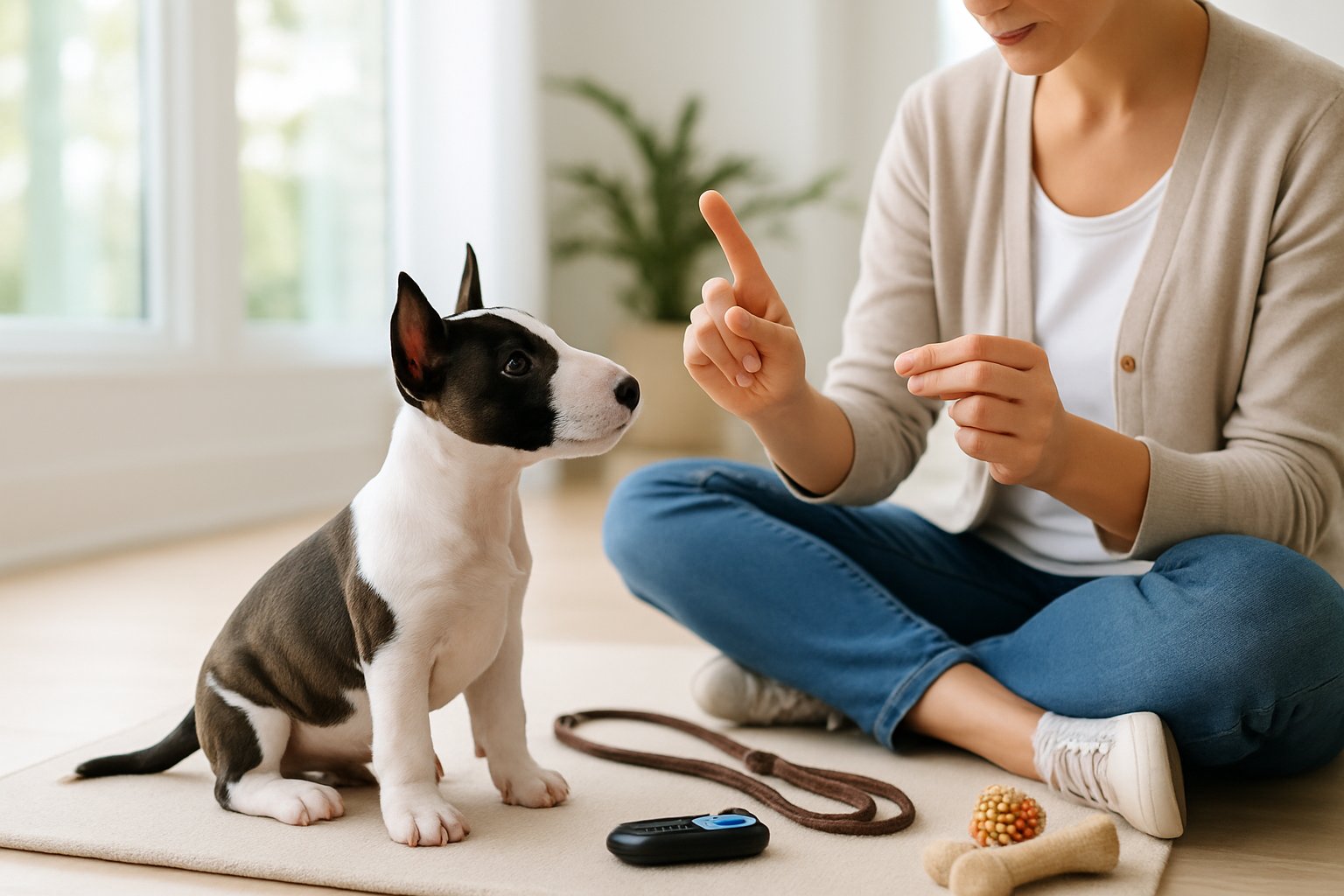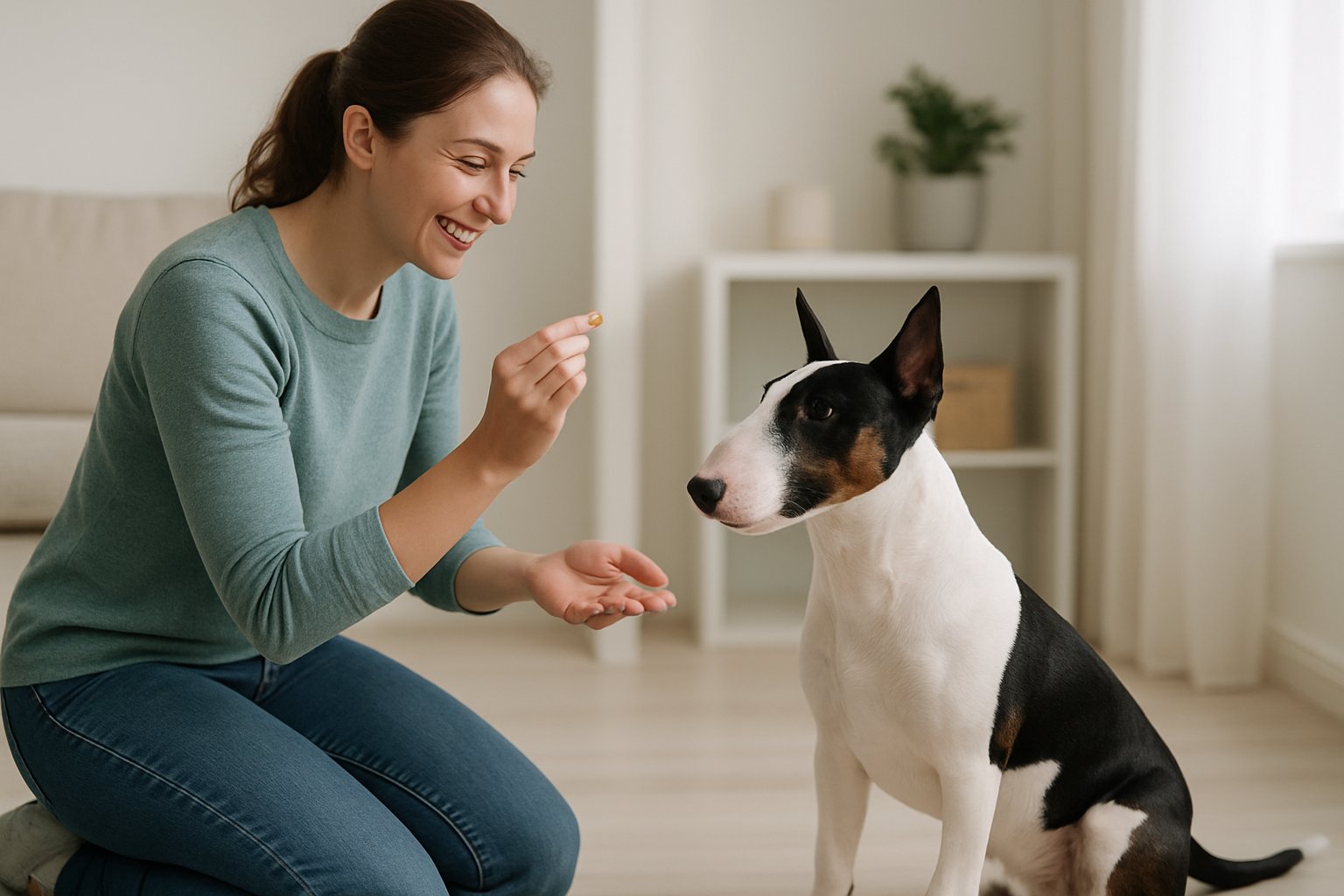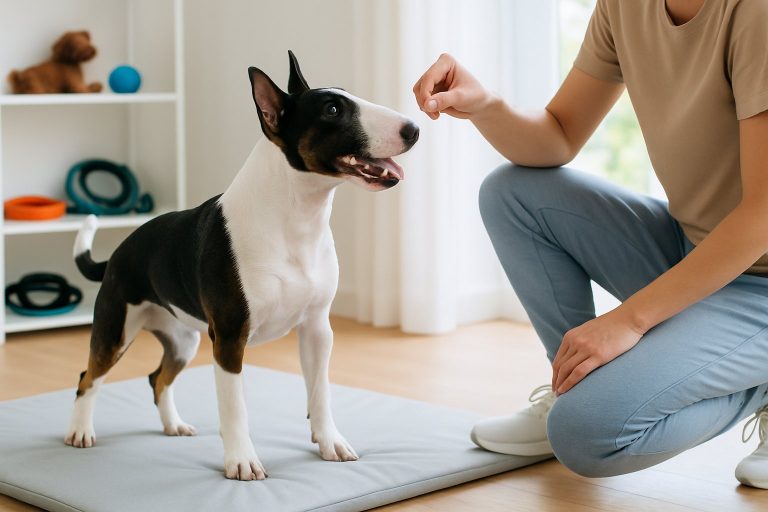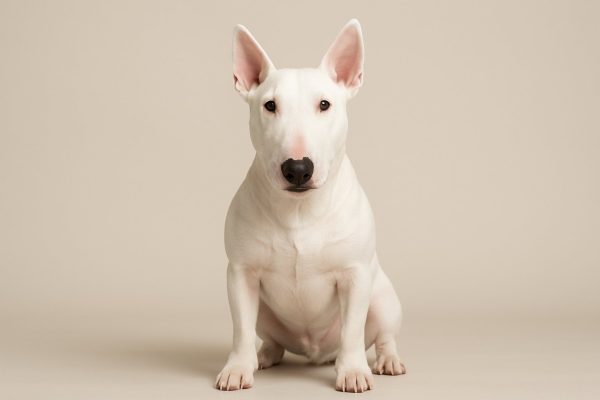Training a Miniature Bull Terrier can be a rewarding challenge for any dog owner. These dogs are known for their unique personality, boundless energy, and distinct look, which can make training both fun and demanding.
Understanding how to guide and train your Miniature Bull Terrier is key to building a happy and well-mannered companion. With the right approach, you can handle their spirited nature while creating a strong bond with your dog.
1. Start training at 8 weeks old to maximize learning capacity
- The best time to start training your Miniature Bull Terrier is at 8 weeks old. Puppies at this age are open to learning new things and form habits quickly. Early training helps prevent unwanted behaviors before they become a problem.
- Keeping lessons short and consistent works well with young Miniature Bull Terriers. Use a firm but friendly tone to reinforce good actions. At this stage, your puppy will respond best to simple commands and clear feedback.
- Consistency is important, so try to work with your puppy every day. Praise and rewards help build a positive association with learning. Training early also helps your dog trust you and understand what is expected.
- Starting at 8 weeks allows you to shape good manners from the beginning. Early, steady training sets a strong foundation for your Miniature Bull Terrier’s behavior as they grow older. For more details, see advice about the best age to start training Miniature Bull Terriers.

2. Use positive reinforcement to build trust and motivation
Positive reinforcement is a proven way to train Miniature Bull Terriers. When your dog follows a command or shows good behavior, reward them with treats, praise, or brief playtime. This helps your dog understand what you expect and makes training a pleasant experience. Miniature Bull Terriers respond well to motivation, especially when training is fun and rewarding. When you use rewards like treats or a favorite toy, you build trust and encourage your dog to listen and learn.
3. Be patient and consistent to manage their strong-willed nature
- Miniature Bull Terriers can be stubborn and like to test boundaries. You might notice your dog ignoring commands or trying to do things its own way. This is normal and part of their spirited personality.
- Sticking to the same routine every time you train is important. Use clear words or signals for each command, and do not change them. Your Miniature Bull Terrier will learn faster when you repeat the same steps.
- Stay calm when your dog doesn’t respond right away. Getting frustrated or raising your voice can make training harder. Aim for short, regular sessions each day instead of long, tiring ones.
- Reward good behavior with treats, praise, or playtime. This will motivate your dog to listen during future lessons. Positive reinforcement works better than punishment for this breed.
- Being patient and consistent is the best way to control their strong-willed behavior. Over time, your training will build respect and trust. You can find more helpful tips for handling their temperament at this comprehensive guide for Miniature Bull Terrier training.
4. Avoid punishment to prevent fear and anxiety
- Using punishment when training a Miniature Bull Terrier can lead to fear, anxiety, and even aggression. These dogs are sensitive and may not understand why they are being punished. This confusion can make behavior problems worse instead of better.
- Instead, focus on positive reinforcement. Give treats, praise, or playtime to reward good behavior. Miniature Bull Terriers learn faster and feel safer when you reinforce what you want them to do, rather than punishing mistakes.
- Negative reinforcement and harsh discipline should be avoided. Training experts agree that punishment-based methods are often harmful and do not work well for this breed.
- By being patient and consistent, you help your Miniature Bull Terrier stay relaxed and confident. Using only positive methods reduces stress and encourages your dog to trust you more over time.
5. Incorporate short, engaging training sessions to maintain attention
- Miniature Bull Terriers have short attention spans, so long training sessions are not very effective. Aim for sessions lasting about 5 to 10 minutes at a time. This makes it easier for your dog to focus and helps prevent boredom.
- Try to keep each lesson fun and interactive. Use toys, treats, or short games as rewards. This makes your dog more interested and eager to participate in training.
- Frequent short sessions throughout the day are better than one long practice. For example, you can work on obedience commands in the morning and practice socialization in the afternoon.
- Focus on clear, simple cues during each session. Miniature Bull Terriers learn best when instructions are easy to understand and the rewards are immediate. Keeping things straightforward helps your dog quickly connect the action with the reward.
- For more detailed advice, you can read about keeping your Miniature Bull Terrier’s training short and engaging to prevent boredom. This technique helps your dog stay motivated and happy during every session.
6. Focus on respect training over strict obedience
- When training your Miniature Bull Terrier, it is important to focus on respect rather than just strict obedience. These dogs are known for their confident and sometimes stubborn attitudes.
- If you rely only on commands and harsh discipline, you may face resistance. Instead, teach your dog basic manners and boundaries in a calm and consistent way.
- Respect training involves clear communication without yelling, hitting, or using force. This approach helps your Miniature Bull Terrier listen to you because they trust you, not because they are scared.
- Use positive reinforcement like treats or praise when your dog makes good choices. This builds a healthy relationship and helps prevent behavioral issues.
- Building respect also means setting limits, such as not allowing your dog on furniture if that is your rule. Stay patient and repeat the lessons daily.
- For more on why respect training matters for this breed, you can read these Miniature Bull Terrier training tips.
- This respectful process creates a dog that is happy to listen without fear or confusion.
7. Socialize early to reduce stubborn behavior around other dogs
Early socialization is important for Miniature Bull Terriers. These dogs are naturally strong-willed and can develop stubborn habits if you do not address their behavior early. Socializing your puppy means letting them meet different people and dogs, and exposing them to new places in a calm and controlled way.
It is best to start socialization when your Miniature Bull Terrier is about eight weeks old. This is a key time for learning, and introducing new experiences now can make a big difference in their temperament. Early socialization helps your dog feel comfortable and confident in new situations.
8. Use clear, calm commands to effectively communicate
When training your Miniature Bull Terrier, speak using short, simple commands. Choose one word for each command, like “sit,” “stay,” or “come.” This helps your dog learn what you want faster and with less confusion. Always use a calm, steady voice. Yelling or repeating commands in a frustrated tone can make your dog anxious or less likely to listen. Keeping a steady tone builds trust and encourages your dog to respond well.

9. Redirect their boundless energy with regular exercise
Regular exercise is one of the most important ways to manage a Miniature Bull Terrier’s high energy during training. Without enough activity, these dogs can get bored and frustrated. This often leads to unwanted behaviors like chewing or digging. Aim for at least an hour of exercise each day. Activities should include brisk walks, play sessions, and interactive games. Varied exercise helps keep your dog both mentally and physically engaged.
10. Avoid yelling or violent methods to foster cooperation
- Never shout at or use violence with your Miniature Bull Terrier. Yelling and harsh actions can make your dog afraid, anxious, or even aggressive. These methods do not help your dog learn and can damage the trust you are trying to build.
- Miniature Bull Terriers respond better to calm, clear direction and rewards for good behavior. This breed is known for its strong personality, so staying patient and consistent works much better than force.
- When you train with positive reinforcement, like treats, praise, or play, your dog is more willing to cooperate. Avoiding punishment-based training methods is important because such tactics can be harmful and ineffective, especially for this energetic breed.
- By focusing on gentle and respectful communication, you help your Miniature Bull Terrier become a happier and more obedient companion. This approach builds trust and strengthens your bond with your dog for years to come.



